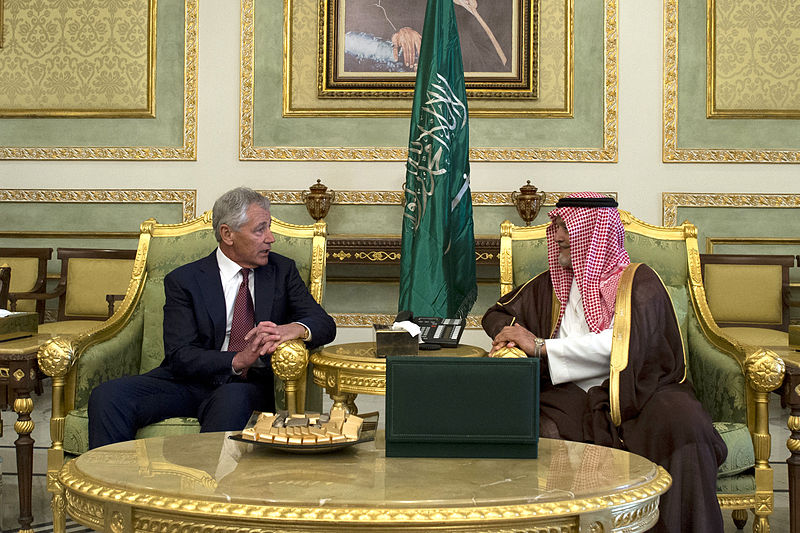
On Oct. 17, Saudi Arabia was elected, for the first time, to the 10-seat rotating membership of the United Nations Security Council, whose permanent members include the United States, Britain, Russia, China, and France. Non-permanent members are elected to hold their seats for two years, during which time they are able to influence the UN’s agenda and avoid, to some extent, international censure.
Within a day of earning a seat on the Security Council, the Saudi government decided to reject the seat – a decision made with approval at the highest levels of the Saudi government by King Abdullah.
The decision is nearly unprecedented, with the only other state ever turning down a seat on the Security Council dating back to the Cold War.
The decision was met by international outrage. Chris Doyle, from the Council for Arab-British Understanding, said “There is shock at their behavior,” and called their actions “petulant and very short term. It’s a teenage tantrum.”
A statement from the Saudi capital, Riyadh, cited failure in Syria as the reason for the Saudi government’s dismissal of the seat. An official statement from the Saudi foreign ministry read: “Allowing the ruling regime in Syria to kill its people and burn them with chemical weapons in front of the entire world and without any deterrent or punishment is clear proof and evidence of the UN security council’s inability to perform its duties and shoulder its responsibilities.”
And herein lies the great irony – that Saudi Arabia’s anxieties over the situation in Syria come not from a lack of UN action in Syria (because the UN, through coordination with the Organization for the Prohibition for Chemical Weapons, has been very actively involved in Syria over the past through months) – but rather, through anxieties that the United States has moved away from its alliance to Saudi Arabia. This movement, in the Saudi government’s opinion, is exemplified by two decisions: through not forcing Syrian president Bashar al Assad out of power in Syria, and through reopening negotiations with Iran.
To explain why Saudi Arabia has these two fears requires reflection to 2012, when the Syrian crisis began. With President Barack Obama focusing on his presidential bid for re-election and Secretary of State Hillary Clinton embroiled in Benghazi politics, the Syrian crisis was left in the hands of the Arab League.
The Arab League, at the point, was still shaking from the aftermath of the Arab Spring – with the notable exceptions of Saudi Arabia and Qatar. Saudi Arabia was focused on containing the unrest of the Arab Spring before it reached Saudi territory, in order to ensure the stability of its own regime. However, it was also equally concerned with making sure that the Arab Spring, which had overturned regional dynamics, would not tip the balance of power in the region away from Saudi interests. Saudi Arabia, which is predominantly a Sunni Muslim society, has been locked in a centuries-old ideological and political conflict with the Islamic Republic of Iran, which is predominantly a Shi’a Muslim country. The Saudis were concerned that the Arab Spring might have made more countries in the region more favorable to Iran – and consequently, less favorable to them.
Therefore, with uprisings in Syria beginning in spring 2011, Saudi Arabia saw an opportunity to influence the course of events in Syria – to potentially break Syria’s alliance with Iran, thus increasing control over the Persian Gulf and the wider Middle East. Unable to directly militarily intervene, Saudi Arabia funneled wealth garnered from oil sales towards arming Syrian rebels. Saudi Arabia hoped that Assad would fall from power, and that he would be replaced by rebels friendly to Saudi Arabia’s ideological causes. Meanwhile, states like Qatar also funneled money into Syria – to different rebel groups. The rebel groups splintered and fractured, none strong enough to overthrow Assad by itself.
Saudi Arabia was initially pleased by the United States’ idea of military strikes in Syria in response to Assad’s use of chemical weapons on his own citizens; the strikes would be effective at losing Assad’s hold in the country and harming his credibility in the international community. However, as the threat of military strikes transitioned into negotiations with Russia – a close ally with Iran and Syria – Saudi Arabia felt threatened. The Saudis publically stated that the negotiations over the Syrian chemical weapons would likely fail and American military strikes were inevitable. However, privately, according to a New York Times report, leaders in Saudi Arabia “fumed” that their goal of shifting the balance in the two-year civil war and deposing Assad was being ignored.
In fact, the negotiations with Russia took the turn that Saudi Arabia wanted the least; Assad was not deposed, brought before any international criminal tribunal, or overthrown. Rather, the U.S. facilitated a negotiation with UN agencies to have international actors come in and witness the destruction of chemical weapons. The United States did not want Assad to be overthrown – with so many splintered rebel groups, it wasn’t clear who would take his place (and with some rebels tied to al Qaeda and other extremist groups, that wasn’t a great gamble to take). However, Saudi Arabia, who had been working closely with the United States and attempting to manipulate the regional dynamics, felt betrayed when suddenly, their goals were put on the backburner in order to craft a deal with the Russians.
Since the United States entered negotiations with Russia over Syria, Iran – a close ally of Russia and Syria – began making moves to rekindle diplomatic relations. Since then, the United States has taken phone calls from Hassan Rouhani, Iran’s new president who has a Twitter account and campaigned on the promise to ease the economic sanctions that have constrained Iran’s economy. Iranian and American relations have thawed, however, with discussions of Iran’s nuclear program taking a positive turn. From Saudi Arabia’s perspective, this was the straw that broke the camel’s back – a sign that the United States. does not have Saudi Arabia’s interests at heart.
So, when Saudi Arabia turned down the UN Security Council seat, it was – dramatically – saying that it as a country it is important, and that its friendship with Western powers is not something to be trifled with. All of these feelings were cloaked under language of the Security Council’s “inabilities to perform its duties,” but the great irony of this statement is that by joining the Security Council, Saudi Arabia might have had an even greater chance to influence proceedings in the region.
The United States made the correct choices by negotiating with Russia over Syria’s use of chemical weapons and by moving forward with talks with Iran. Both choices were crucial for regional stability. However, U.S. officials should remain highly cognizant that these actions are alienating several regional powers, Saudi Arabia included. It should make sure it remains actively engaged with its current allies in order to ensure regional stability.

